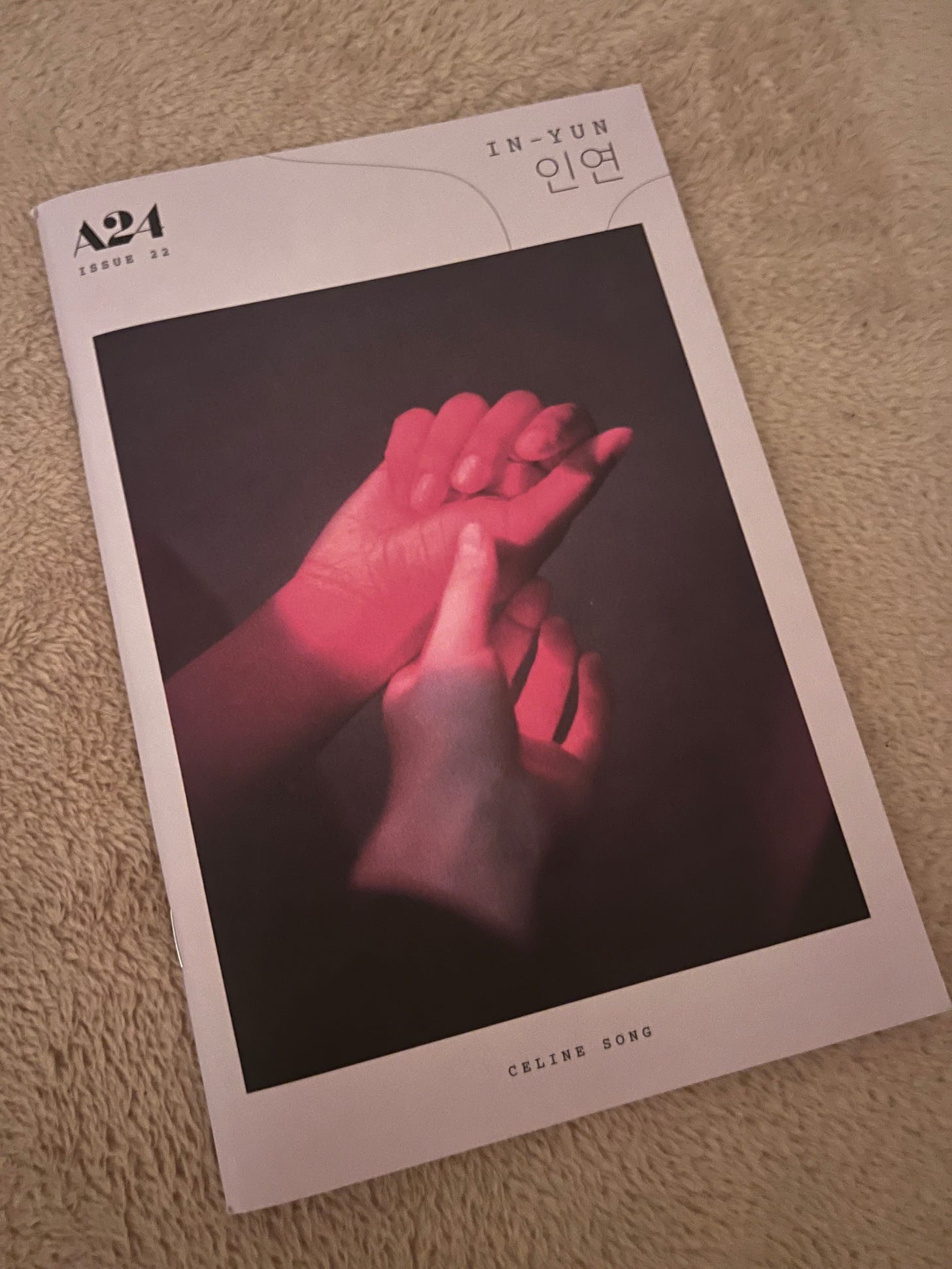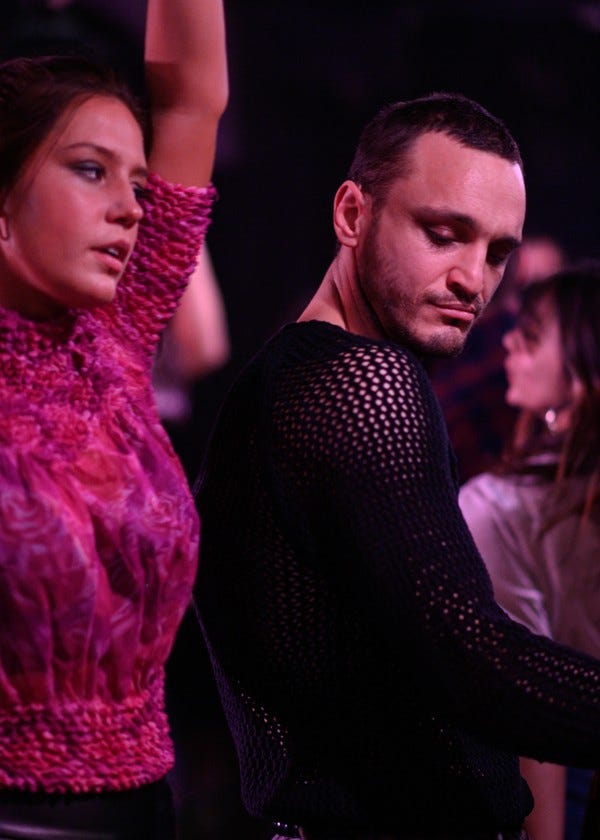Introduction:
Today, I want to focus on two new relationship dramas (that happen to be two of the best films of 2023): Past Lives and Passages. The former shows us a healthy couple navigating deep-rooted, complex emotions with respect and empathy, whereas the latter … well, the latter does not. Yet, despite their differences, you will leave both films feeling at peace and satisfied - but also a little like you reawakened something you’re nostalgic for. You might feel sad after both movies, but there’s a new, wiser perspective you gain that softens that sadness just a little bit. Hollywood hunk Jake Gyllenhaal has the perfect word for today’s vibe:
The Aesthetic:
Both films have scenes depicting what I call “the David Gray aesthetic.” Here are two David Gray videos for reference:
Please Forgive Me, David Gray
Babylon, David Gray
The David Gray aesthetic means you’ll probably see some people walking in the rain. There will be reflections in puddles. You may see someone aimlessly cycling down a city street at night. There will be lots of goodbyes.*
I’m not suggesting that these movies lack substance. It’s very much the opposite. During and after both films, I experienced multilayered emotions. But having said that, I’m a little shocked that neither Ira Sachs nor Celine Song chose a David Gray song for their soundtracks.
Deep Dive:
Normies just need an aesthetic and a one-word vibe to decide whether to see a movie. But you guys … you guys aren’t most people. CineVibez subscribers (a subscription is free, so get one) are obvi cinephiles through and through. You guys want more. Well I’ve got more, baby:
Past Lives (2023), Celine Song
Celine Song’s standout debut, Past Lives, follows Na Young, a South Korean girl who emigrates with her family to the United States. After moving, Na Young’s mother changed Na Young’s name to Nora to assimilate. Unfortunately, Nora left Hae Sung, her girlhood crush, behind as Na Young. It takes decades, but Hae Sung eventually finds Nora on Facebook. They briefly reunite on Skype, but Hae Sung’s time with Nora always seems short-lived. Years later, the two must confront their complicated feelings when Hae Sung visits Nora in New York.
You guys, this movie is so good. As Na Young/Nora, Greta Lee nails some tough, intimate scenes with John Magaro, who plays her husband Arthur. And in turn, Magaro’s Arthur handles the delicate parts of Nora’s relationship with Hae Sung so well that it makes you want to be a better person. But his pain, oh man, I felt every inch of his pain. The acting was incredible. And Hae Sung’s uncomfortableness around Arthur was so good. Every character’s perspective was given the attention and respect they deserved; Celine Song deserves a lot of credit for that.
Anywho, In the most general of ways, I’ve been in Nora’s position. I’ve been in Arthur’s position. I’ve been in Hae Sung’s position. I think we all have.
In fact, universal vibes are great side vibes you may feel during Past Lives. Side vibes are potential vibes. Some may feel these vibes, others may not. Anyway, you may feel more connected to the universe and all living beings after seeing Past Lives. And I call this a universal vibe. It’s all about feeling connected.
Is In-Yun a Vibe?
There is a great scene where Nora woos her husband with a story she says Koreans tell to seduce others. The story is about “in-yun,” a Korean word without an English equivalent. Celine Song curated a really cool issue of A24’s magazine about the idea of “in-yun.”
Song likens “in-yun” to the Western concept of “destiny,” although the two words have different meanings rooted in their respective cultural value systems. Western ideals see ”destiny” as something you need to reach out and grab. You make your own “destiny.” But “in-yun” is something that happens to you. You cannot stop it, and the only thing you can do is accept it and figure out how to get through it.
Another way to define “in-yun” is to think of it as how the universe puts two people in the same space and time, against all odds, whether they like it or not. For example, I have a deep “in-yun” with my wife, but my “in-yun” with someone I bump into on the street is much lighter. Song wrote that “in-yun” is spoken regularly in South Korea, like “wow we’re totally in-yun.”
Greta Lee, a.k.a. Nora, calls “in-yun” a pre-ordained bond that tethers two souls together with an invaluable thread that permeates all space and time. That’s some heavy stuff, so let’s go with something less intense.
I like Grace Yun’s definition the best. Yun, the Past Lives production designer, said “in-yun” is a person or a thing that makes me feel past, present, and future all in one moment. Now that is most definitely a vibe. And here’s the craziest part: I felt past events almost simultaneously after the movie, most certainly triggered by watching Past Lives. And, as always, a flood of memories comes with a high probability of melancholy.
My fave Letterboxd review of Past Lives comes from The Bear’s Ayo Edebiri:
“You know when a movie is directly made for you to feel ripped apart into 1 million pieces but that feeling alone makes you feel like a complete person and then you get to drive alone home and cry to Radiohead? Yeah :) yeah one of those ones for lil ol’ Edebiri (me!)”
Past Lives is a great title, by the way. Not only does it reference how we change over time, but it also speaks to past relationships. And you know that feeling when you combine friend groups or your girlfriend meets your parents for the first time? You may feel those vibes, too.
Passages (2023), Ira Sachs
Past Lives is about personalities fated to intertwine, whereas Ira Sachs’ Passages is about one personality everyone avoids. Despite that distinguishing factor, both movies have similar vibes: you still feel longing, sadness, and melancholy. You’re even going to get a little “in-yun.”
In the A24 ‘zine, Celine Song distinguished “in-yun” from the Western concept of “destiny.” You make your own “destiny.” But “in-yun” is something that happens to you. Passages is a great representation of the Western idea of “in-yun” or “destiny” by showing Franz Rogowski’s Tomas selfishly force himself in and out of two relationships.
When the movie starts, we are thrown into the middle of the marriage between Tomas and Martin (played by Ben Wishaw). Using no tact, Tomas tells Martin that he recently slept with a woman. But this isn’t really a confession. Instead, Tomas sounds like Donald Trump bragging to Extra’s Billy Bush.
As the marriage falls apart, Tomas spends more and more time with Adèle Exarchopoulos’ Agathe, the aforementioned woman. When her patience grows thin, Tomas goes back to Martin. The cycle continues, leaving pain and destruction in Tomas’ wake.
Tomas shows us a messed up version of Western “in-yun” when he’s yo-yo-ing between Martin and Agathe. And this isn’t something that simply happens. Tomas forces his way back into both relationships for attention and personal gain. His drive distinguishes this film from Past Lives: fate is no longer part of the equation.
But the melancholy vibes are still there, almost solely due to Ben Wishaw’s incredible performance. You see the longing for the past in his eyes. Each facial expression reveals exhaustion and defeat, but a desire for what once was.
Post-Script:
If you want to feel a little melancholy or reminisce about the past or “what-ifs,” check out Past Lives and Passages. They’re both great movies.
FYI: It’s been over a month since my last newsletter. I’ve been really busy! But anyway, I’m going to shoot for weekly posts going forward. I’m also removing all paywalls from my premium content. So, Mom, you should be getting a refund soon.
FYII: I’ve been enjoying R-Rated Comedies this summer. No Hard Feelings, Joy Ride, and Strays were really fun movies. They did average to a little below average at the box office, but I think they’ll find audiences on streaming.







Two great movies! Another thing they have in common - they both have one scene where the two characters on either side of the love triangle share a scene together without the central figure present - in Past Lives, at the bar when Nora is in the bathroom, and in Passages, at the diner when Martin gives Agathe the baby gift. In both cases, rather than showing any understandable hostility, the characters are kind to each other and are understanding of the other’s position. I really liked those scenes in both movies.